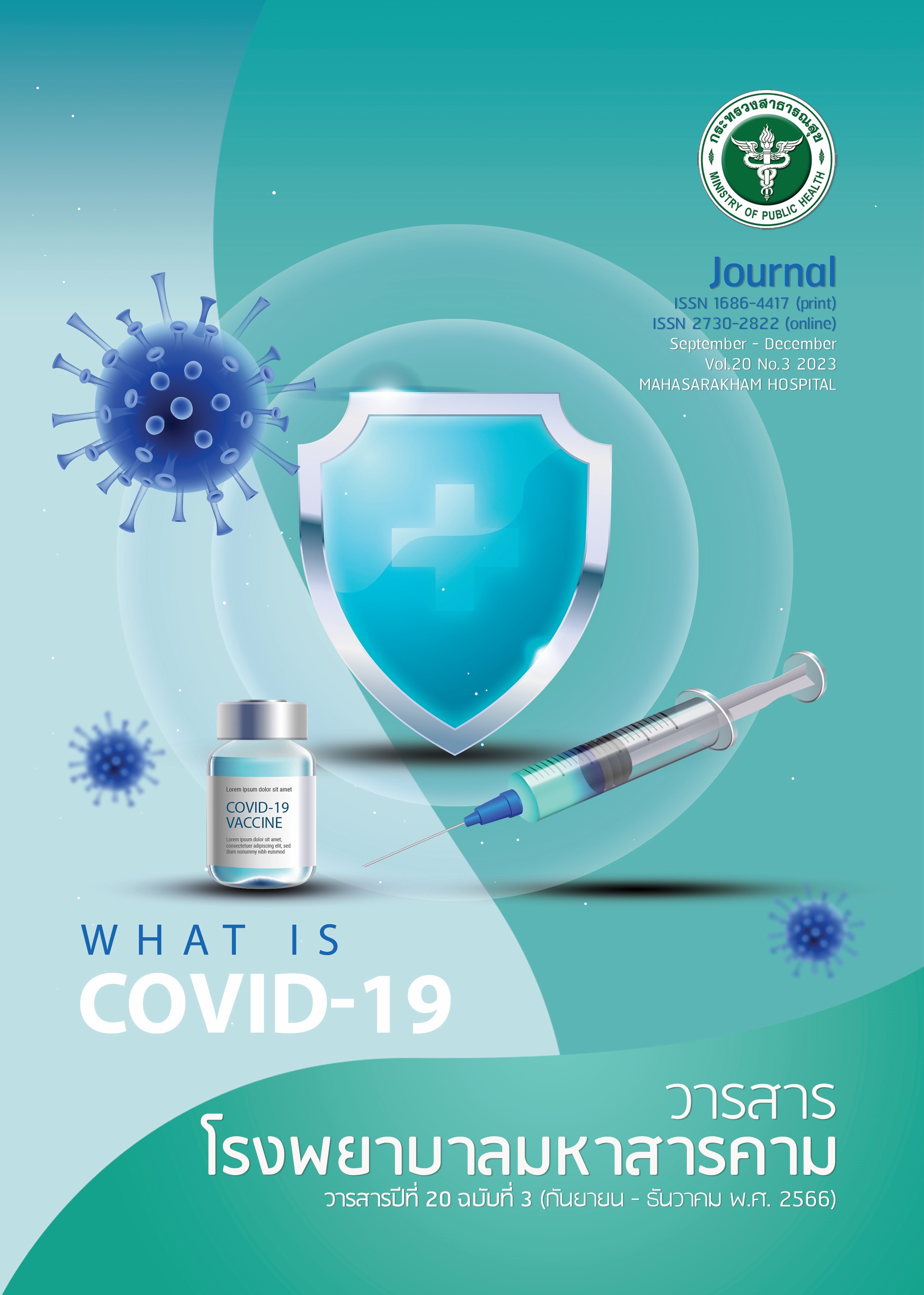การส่งเสริมการทำหน้าที่ของครอบครัวโดยใช้การอบรมเลี้ยงดูเด็กเชิงบวกในการดูแลเด็กสมาธิสั้น: บทบาทสำคัญของพยาบาล
คำสำคัญ:
เด็กสมาธิสั้น, การทำหน้าที่ของครอบครัว, การอบรมเลี้ยงดูเด็กเชิงบวก, บทบาทพยาบาลบทคัดย่อ
สมาธิสั้นเป็นปัญหาสุขภาพจิตในเด็กและวัยรุ่นที่พบมากที่สุด ส่งผลกระทบต่อเด็กและครอบครัวในระยะยาว ครอบครัวเป็นสิ่งแวดล้อมหน่วยย่อยแรกที่ใกล้ชิดกับเด็กและมีอิทธิพลต่อพัฒนาการและการปรับพฤติกรรมเด็กมากที่สุด เมื่อครอบครัวต้องดูแลเด็กสมาธิสั้นทำให้ต้องมีการปรับเปลี่ยนการทำหน้าที่ของครอบครัวในทุกมิติประกอบด้วย ด้านการแก้ปัญหา ด้านการสื่อสาร ด้านบทบาท ด้านการตอบสนองต่ออารมณ์ ด้านความผูกพันทางอารมณ์ และด้านการควบคุมพฤติกรรม ในขณะที่การทำหน้าที่ของครอบครัวที่ดีจะเป็นปัจจัยที่ช่วยให้การควบคุมอาการสมาธิสั้นได้ดีขึ้น ในระยะเริ่มต้นพยาบาลควรมีการส่งเสริมการทำหน้าที่ของครอบครัวโดยประยุกต์ใช้การอบรมเลี้ยงดูเด็กเชิงบวก โดยการสร้างความผูกพัน การยอมรับในตัวเด็ก การเลี้ยงดูเด็กเชิงรุก การเป็นผู้นำในการเห็นอกเห็นใจผู้อื่น การสร้างวินัยเชิงบวกมาใช้เป็นข้อมูลพื้นฐานในการให้ความรู้คำแนะนำแก่ครอบครัวในการดูแลเด็กสมาธิสั้นเพื่อให้มีการปรับเปลี่ยนการปฏิบัติต่อเด็กตั้งแต่ระยะเริ่มต้นเพื่อลดการเกิดปัญหาพฤติกรรมและผลกระทบที่เกิดขึ้นในระยะยาวในเด็กสมาธิสั้นต่อไป
เอกสารอ้างอิง
Danielson ML, Bitsko RH, Ghandour RM, Holbrook JR, Kogan MD, Blumberg SJ. Prevalence of parent-reported ADHD diagnosis and associated treatment among US children and adolescents, 2016. Journal of Clinical Child & Adolescent Psychology. 2018;47(2):199-212.
Centers for Disease Control Prevention. Data and statistics on children’s mental health. Retrieved on October. 2019;15:2019.
American Psychiatric Association. Diagnostic and statistical manual of mental disorders 5th edition American Psychiatric Publishing. Arlington, VA, USA: Doi. 2013;10.
World Health Organization. Comprehensive mental health action plan 2013–2020. Geneva: World Health Organization. 2013.
Ching’oma CD, Mkoka DA, Ambikile JS, Iseselo MK. Experiences and challenges of parents caring for children with attention-deficit hyperactivity disorder: A qualitative study in Dar es salaam, Tanzania. Plos one. 2022;17(8):e0267773.
Sayal K, Prasad V, Daley D, Ford T, Coghill D. ADHD in children and young people: prevalence, care pathways, and service provision. The Lancet Psychiatry. 2018;5(2):175-86.
Visanuyothin T, Pavasuthipaisit C, Wachiradilok P, Arunruang P, Buranasuksakul T. The prevalence of attention deficit/hyperactivity disorder in Thailand. Journal of Mental Health of Thailand. 2013;21(2):66-75.
Lahey BB, Pelham WE, Loney J, Lee SS, Willcutt E. Instability of the DSM-IV subtypes of ADHD from preschool through elementary school. Archives of general psychiatry. 2005;62(8):896-902.
Caye A, Swanson J, Thapar A, Sibley M, Arseneault L, Hechtman L, et al. Life span studies of ADHD—conceptual challenges and predictors of persistence and outcome. Current psychiatry reports. 2016;18(12):111.
Penuelas-Calvo I, Palomar-Ciria N, Porras-Segovia A, Miguélez-Fernández C, Baltasar-Tello I, Colmenero SP, et al. Impact of ADHD symptoms on family functioning, family burden and parents’ quality of life in a hospital area in Spain. The European Journal of Psychiatry. 2021;35(3):166-72.
Schiltz HK, McVey AJ, Gonring K, Haendel AD, Murphy C, Van Hecke AV, et al. Examining Differences in Parenting Stress, Parenting Efficacy, and Household Context among Mothers of Youth with Autism and/or ADHD. Journal of Child and Family Studies. 2022;31(3):774-89.
Choksomngam Y, Jiraporncharoen W, Pinyopornpanish K, Narkpongphun A, Ongprasert K, Angkurawaranon C. Associations between Family Functioning and Symptoms of Attention-Deficit Hyperactivity Disorder (ADHD): A Cross-Sectional Study. Healthcare. 2022;10(8):1502.
Anastopoulos AD, Sommer JL, Schatz NK. ADHD and family functioning. Current Attention Disorders Reports. 2009;1(4):167-70.
Aghebati A, Gharraee B, Hakim Shoshtari M, Gohari MR. Triple p-positive parenting program for mothers of ADHD children. Iranian Journal of Psychiatry and Behavioral Sciences. 2014;8(1):59-65.
Taghizade S, Mahmoodi Z, Zandifar A, Qorbani M, Mohamadi F, Mehrafzoun N. The relationship model among parent-child relationship, coping responses and behavioral problems in children with attention deficit hyperactivity disorder. 2022.
Black, M M, Jukes, CH M, Willoughby, T M. Behavioural and emotional problems in preschool children. The Lancet Psychiatry. 2017;4(2):89-90.
Belanger SA, Andrews D, Gray C, Korczak D. ADHD in children and youth: Part 1—Etiology, diagnosis, and comorbidity. Paediatrics & Child Health. 2018;23(7):447-53.
Connaughton M, Whelan R, O'Hanlon E, McGrath J. White matter microstructure in children and adolescents with ADHD. NeuroImage: Clinical. 2022;33:102957.
ชาญวิทย์ พรนภดล. โรคสมาธิสั้น ADHD Attention Deficit Hyperactivity Disorder. กรุงเทพมหานคร: สำนักพิมพ์ศิริราช; 2562. 425 p.
วิลาวัณย์ เชิดเกียรติกำจาย. ตำราพัฒนาการและพฤติกรรมเด็ก เล่ม 4. สุรีลักษณ์ สุตริตพงศ์ รร, ทิพวรรณ หรรษาคุณาชัย, บานชื่น เบญจาสุวรรณเทพ, อิศศร์สุดา เฟื่องฟู, จริยา โรจน์มหามงคล, editor. กรุงเทพมหานคร: บริษัท พี.เอ.ลัฟวิ่ง จำกัด; 2561. 601-14 p.
Association AP. Diagnostic and statistical manual of mental disorders (DSM-5®): American Psychiatric Pub; 2013.
Doernberg E, Hollander E. Neurodevelopmental Disorders (ASD and ADHD): DSM-5, ICD-10, and ICD-11. CNS spectrums. 2016;21(4):295-9.
Lambez B, Harwood-Gross A, Golumbic EZ, Rassovsky Y. Non-pharmacological interventions for cognitive difficulties in ADHD: A systematic review and meta-analysis. Journal of Psychiatric Research. 2020;120:40-55.
สุพร อภินันทเวช. การรักษาโรคสมาธิสั้นด้วยยาและจิตสังคมบำบัดในประเทศไทย. เวชบันทึกศิริราช. 2562;9(3):175-81.
Mechler K, Banaschewski T, Hohmann S, Häge A. Evidence-based pharmacological treatment options for ADHD in children and adolescents. Pharmacology & Therapeutics. 2022;230:107940.
Ruiz-Goikoetxea M, Cortese S, Aznarez-Sanado M, Magallón S, Zallo NA, Luis EO, et al. Risk of unintentional injuries in children and adolescents with ADHD and the impact of ADHD medications: a systematic review and meta-analysis. Neuroscience & Biobehavioral Reviews. 2018;84:63-71.
Brunkhorst-Kanaan N, Libutzki B, Reif A, Larsson H, McNeill RV, Kittel-Schneider S. ADHD and accidents over the life span–A systematic review. Neuroscience & Biobehavioral Reviews. 2021;125:582-91.
Kofler MJ, Irwin LN, Soto EF, Groves NB, Harmon SL, Sarver DE. Executive functioning heterogeneity in pediatric ADHD. Journal of abnormal child psychology. 2019;47:273-86.
Czamara D, Tiesler C, Kohlböck G, Berdel D, Hoffmann B. Children with ADHD Symptoms Have a Higher Risk for Reading. Spelling and. 2013.
Humphreys KL, Galán CA, Tottenham N, Lee SS. Impaired social decision-making mediates the association between ADHD and social problems. Journal of abnormal child psychology. 2016;44:1023-32.
Friedman MM, Bowden, V. R., & Jones, E. G. . Family nursing: Research, theory and practice 5, editor. New Jersey: Upper Saddle River; 2003.
อุมาพร ตรังคสมบัติ. จิตบำบัดและการให้คำปรึกษาครอบครัว. กรุงเทพมหานคร: ซันต้าการพิมพ์; 2545.
รุ่งรัตน์ สุขะเดช. การอบรมเลี้ยงดูเด็กของครอบครัวไทย: การทบทวนวรรณกรรมแบบบูรณาการอย่างเป็นระบบ. วารสารพยาบาลศาสตร์และสุขภาพ. 2563;43(1):1-9.
รวิวรรณ รุ่งไพบูลย์วรรณ. การอบรมเลี้ยงดูบุตรเชิงบวก Positive Parenting สุรีลักษณ์ สุตริตพงศ์ ทห, บานชื่น เบญจาสุวรรณเทพ, อดิศร์สุดา เฟื่องฟู, จริยา จุฑาพิสิทธิ์, พัฎ โรจน์มหามงคล , editor. กรุงเทพมหานคร: บริษัท พี.เอ.ลิฟวิ่ง จำกัด; 2561. 55-62 p.
Khademi M, Ayatmehr F, Khosravan Mehr N, Razjooyan K, Davari Ashtiani R, Arabgol F. Evaluation of the Effects of Positive Parenting Program on Symptoms of Preschool Children With Attention Deficit Hyperactivity Disorder. Practice in Clinical Psychology. 2019;7(1):11-20.
Eanes R. Positive parenting: An essential guide: Penguin; 2016.
Curtis D, Heath C, Chapman S, Elkins S. Family skills training intervention for ADHD: Putting the child back into child therapy. Journal of Psychological Abnormalities in Children. 2013;1(2):1-7.
Miller, W. I, Ryan CE, Keitner GI, Bishop DS, Epstein NB. The McMaster approach to families: Theory, assessment, treatment and research. Journal of Family Therapy. 2000;22(2):168-89.
Lussier-Desrochers D, Massé L, Simonato I, Lachapelle Y, Godin-Tremblay V, Lemieux A. Evaluation of the Effect of a Serious Game on the Performance of Daily Routines by Autistic and ADHD Children. Advances in Neurodevelopmental Disorders. 2023:1-13.
ดาวน์โหลด
เผยแพร่แล้ว
รูปแบบการอ้างอิง
ฉบับ
ประเภทบทความ
สัญญาอนุญาต
ลิขสิทธิ์ (c) 2023 วารสารโรงพยาบาลมหาสารคาม

อนุญาตภายใต้เงื่อนไข Creative Commons Attribution-NonCommercial-NoDerivatives 4.0 International License.
วารสารนี้เป็นลิขสิทธิ์ของโรงพยาบาลมหาสารคาม






